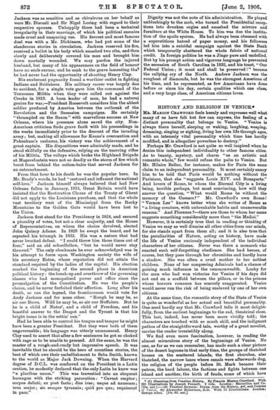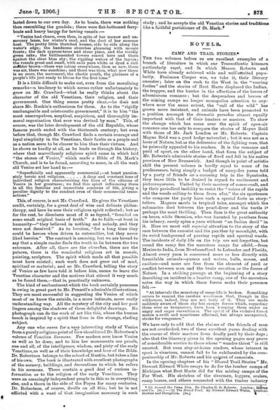HISTORY AND RELIGION IN VENICE.* MARION CRAWFORD feels keenly and
expresses well what many of us have felt but few can express, the feeling of a distinct personality that belongs to Venice. " Venice is always there herself, sleeping or waking, laughing, weeping, dreaming, singing or sighing, living her own life through ages, with an intensely vital personality which time has hardly modified, and is altogether powerless to destroy."
Perhaps Mr. Crawford is net quite so well inspired when he denies this independent individuality to other famous cities. As to beauty, mystery, and charm "as an artistic and romantic whole," few would refuse the palm to Venice. But Mr. Hilaire Belloc, for instance, makes for Paris the same claim to an independent personality. It must certainly annoy him to be told that Paris would be nothing without the Parisians, that she "suggests Louis XIV. and Bonaparte." And lovers of Rome, to whom the Eternal City is a living being, terrible perhaps, but most convincing, how will they answer the question, " What would Rome be without the memory of the Caesars?" Mr. Crawford's own Rome! " Vernon Lee" knows better when she writes of Rome as " a living creature, with unbreakable habits and unanswerable reasons." And Florence P—there are those to whom her name suggests something considerably more than " the Medici."
However, it is certainly true that in reading or thinking of Venice we may as well dismiss all other cities from our minds, for she stands apart from them all; and it is also true that the peculiarities of Nature, acting on history, have made the life of Venice curiously independent of the individual characters of her citizens. Never was there a monarch who exacted such self-forgetting obedience. She had heroes, of course, but they pass through her chronicles and hardly leave a shadow. She was often a cruel mother to her noblest children. None of her conquering Admirals had a chance of gaining much influence in the commonwealth. Lucky for the man who had won victories for Venice if his days did not end on a scaffold between the pillars, or in the prisons whose horrors romance has scarcely exaggerated. Venice would never run the risk of being enslaved by one of her own citizens.
At the same time, the romantic story of the State of Venice is quite as wonderful as her actual and beautiful personality. One need hardly say that Mr. Crawford tells it most delight- fully, from the earliest beginnings to the sad, theatrical close. This last, indeed, has never been more vividly told ; the characters are touched with so much skill, and the indignant pathos of the straightforward tale, worthy of a great novelist, carries the reader irresistibly along.
We find even more fascination, however, in reading the almost miraculous story of the beginnings of Venice. No one, as far as we can remember, has made such a clear picture of the desert lagoons in that early time, the groups of thatched houses on the scattered islands, the first churches, also thatched, the narrow lanes where canals were afterwards dug, the religion of the people before St. Mark became their patron, the hard labour, the factions and fights between one island and another, the birth of feuds, some of which have
• (1) Gleanings from Venetian History. By Francis Marion Crawford. With 225 Illustrations by Joseph Pennell. 2 vole. London: Macmillan and Co. [21s. net]—(2) Venetian Sermons: Drawn from the History, Art, and Customs of Venice. By Alexander Robertson, D.D. With 73 Llustratiow. London$ George Allen. [10s. 6d. net.]
lasted down to our own day. As to boats, there was nothing then resembling the gondola ; there wore flat-bottomed ferry- boats and heavy barns for towing vessels :—
" Venice had charm, even then, in spite of her narrow and un- savoury lanes, her winter's mud, and the dust of her summer heat. The pretty little thatched houses, side by side along the water's edge; the handsome churches gleaming with mosaic fronts ; the dark cypress-trees and stone pines, and the vividly green oaks ; the battlemented towers reared here and there against the clear blue sky; the rippling waters of the lagoon ; the vessels great and small, with sails pure white or dyed a rich minder brown—there was colour everywhere, then as now, there was air, there was sunshine ; and there was then, what now there is no more, the movement, the elastic youth, the gladness of a people's life just ready to bloom for the first time."
It is a little difficult to make out, even from the moralising remarks—a tendency to which seems rather unfortunately to grow on Mr. Crawford—what he really thinks about the character of the old Venetians, their religion, and their
government. One thing seems pretty clear,—he doe's not share Mr. Ruskin's enthusiasm for them. As to the "rigidly unchangeable and aristocratic government," it is to him "the most unscrupulous, sceptical, suspicious, and thoroughly im- moral organisation that ever was devised by man." This, of course, was the later development of the old Republic, whose famous youth ended with the thirteenth century; but even before that, though Mr. Crawford finds a certain courage and loyal simplicity in the Venetians, their faults as a people and as a nation seem to be clearer to him than their virtues. And he shows us hardly at all, as he leads us through the history, where that marvellously religious spirit came in which laid "the stones of Venice," which made a Bible of St. Mark's Church, and is to be found, according to some, in all the work old Venice set her band to:—
"Superficially and apparently commercial at heart passion- ately heroic and religions A deep and constant tone of individual religion characterising the lives of the citizens of Venice in her greatness ; we find this spirit influencing them in all the familiar and immediate concerns of life, giving a peculiar dignity to the conduct even of their commercial trans- actions."
This, of course, is not Mr. Crawford. He gives the Venetians credit, certainly, for a great deal of wise and delicate philan- thropy, and here he sees their religious spirit reflected ; but as for the rest, he dismisses most of it as legend, "founded on some small original basis of truth." As to faith—at least in humanity—" they believed in nothing and nobody, and they were not deceived." As to heroism, " for a long time they could be heroes when driven to extremities, but they never liked heroics." The contrast is amusing, but we are bound to say that a simple reader finds the truth to lie between the two extremes. After all, there are the churches, there are the palaces, there is the wonderful religious art in mosaic, painting, sculpture. The spirit which made all that possible
must have existed ; such work does not grow out of mud, spiritual or material ; and so Mr. Crawford, telling the story of Venice as few have told it before him, seems to leave the Venetian character and the motives that stirred it very much as he found them,—that is, practically unknown.
The kind of enchantment which the book certainly possesses is owing in great part to Mr. Pennell's admirable illustrations, They are most successful in suggesting the Venice of which most of us know the outside, in a more intimate, more really understanding way. All the mystery of the city and her past lingers among the shadows of these delightful drawings. No photograph can do the work of art like this, where the human touch is inspired by a spirit that lives in the strange, eluding subject.
Any one who cares for a very interesting study of Venice from a purely religious point of view should read Dr. Robertson's volume of Venetian Sermons. Few modern men know Venice as well as he does ; and to him her monuments are proofs, one and all, of the intelligence, wisdom, and piety of the early Venetians, as well as of their knowledge and love of the Bible. Dr. Robertson belongs to the school of Ruskin, but takes a line of his own. The book is illustrated with excellent photographs
of the scenery, buildings, and decorations to which be refers in his sermons. These contain a good deal of curious in- formation as to the religion of the early Venetians. They were an amazingly independent people in this as in everything else, and a thorn in the side of the Popes for many centuries Dr. Robertson, of course, dwells on all this; but he is not afflicted with a want of that imagination necessary in such
study ; and he accepts the old Venetian stories and traditions like a faithful parishioner of St. Mark.,







































 Previous page
Previous page